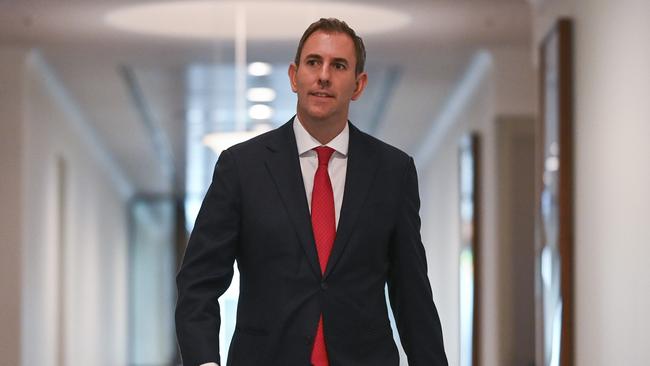Jim Chalmers says Labor is improving approvals for major projects
Jim Chalmers says Labor will make it easier for resource companies to navigate the approvals process as the government seeks Coalition support for changes to the PRRT.

Jim Chalmers has unveiled changes to help fast-track approvals for major projects in a bid to secure Coalition support for a tougher petroleum resource rent tax (PRRT) in a speech warning that the balance of risks was shifting in the Australian economy “from inflation to growth.”
In a keynote address to a business summit in Sydney on Monday, Dr Chalmers said the government’s approach to the economy would shift - inflation would remain the government’s “primary focus” but not the “sole focus.”
“Inflation is still the main game, but we can’t ignore the way the economy is slowing,” Dr Chalmers said.
He again stressed that the “soft landing we seek at home and in the global economy is assumed but not yet assured.”
“The UK and Japan finished the year in recession, and around a quarter of the G20 has either recorded a technical recession or narrowly avoided one. That’s before the effect of synchronised monetary policy tightening around the world is fully felt,” he said. “And last week Chinese authorities announced that they expect a period of softer growth to continue there.”
Dr Chalmers said that the recent national accounts had confirmed that the economy was slowing and Australians were “tightening their spending as the impact of higher interest rates and persistent inflation bites.”
“Markets and economists expect growth to remain weak in the first half of this year,” he said.
While he sketched out the government’s growth challenge, Dr Chalmers also used the speech to announce a number of initiatives being taken by the government to reduce business costs and boost productivity.
These initiatives include a push to abolish about 500 “nuisance” tariffs that raise little revenue but which saddle business with extra compliance costs and a series of changes to ensure companies can better navigate Australia’s system of environmental approvals.
Dr Chalmers said Labor was taking action to improve the approvals process and that he had written in recent days to Opposition treasury spokesman Angus Taylor and Opposition resources spokeswoman Susan McDonald to “assure them that some of the changes to environmental approval processes they are seeking to negotiate are already happening.”
“We’re looking to improve and streamline a range of approvals and regulatory processes as well,” Dr Chalmers said. “Including through reforms to streamline the Environmental Protection and Biodiversity Conservation process and make sensible changes to the petroleum resource rent tax (PRRT).”
“Unfortunately the Opposition has sought to delay and complicate these sensible changes, dashing off letters and making threats, and this has created unnecessary uncertainty,” he said.
Dr Chalmers said Labor’s changes would provide more funding to “invest in data so we can identify where the environmental risks are upfront”.
“This will accelerate approvals through better use of data – meaning better, faster decision making and clear priorities without cutting corners on environmental protection – resulting in faster ‘yesses and faster nos’.”
He also said Labor would “clarify consultation requirements for offshore oil and gas storage regulatory approvals, making consultation more targeted and effective.”
This would include providing “better upfront guidance on when approvals are required so proponents know if their project needs to go through the process.”
“Our changes are designed to be better for the environment, better for business and better for our economy,” he said. “They are a practical way to clarify what our national environmental standards are and make it faster and easier to assess whether a project meets them.”
Labor is hoping to secure Opposition support for its legislation to toughen the PRRT which is aimed at raising an extra $2.4bn over four years. The Greens have said they want to double the revenue from Labor’s shake-up of the PRRT and raise an extra $5.6bn from LNG producers over the decade or they will vote against the government’s legislation in the Senate.
Dr Chalmers said the changes to approvals were being made “for their own good reasons, not as a bargaining chip” because Labor saw there was a “need to update Australia’s offshore regulatory gas arrangements and broader environmental approval processes.”
He also used the speech to the AFR business summit to say Labor was “clarifying the regulatory regime for our banks, particularly the medium-sized and smaller players.”
The government will introduce a “financial sector regulatory initiatives grid” to provide transparency around the regulatory landscape for the financial sector.
Dr Chalmers said the grid would help financial services businesses engage with the government and regulators more effectively.
Opposition treasury spokesman Angus Taylor was not immediately swayed by Dr Chalmers’ announcements on improvements to the approvals process for major projects, warning that Labor’s PRRT changes could not add to the pressure created by its industrial relations and energy policy overhauls.
“It’s taken three Labor Ministers over 100 days just to respond to the Coalition’s letter regarding the PRRT legislation,” Mr Taylor said. “We will go through the details and go back to the government in due course.”
“The Senate inquiry into this bill is not due to report until the 18th of April. Our gas industry is vital for our manufacturers and bringing down household bills.
“The resources sector is vital to our economic prosperity and jobs across the country. Labor’s policies on industrial relations, energy, and red and green tape are already putting thousands of jobs, businesses and families that rely on the resources sector at risk. The PRRT legislation must not add to that pressure.”







To join the conversation, please log in. Don't have an account? Register
Join the conversation, you are commenting as Logout